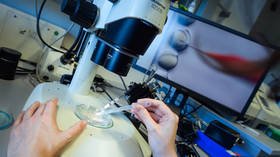Gene-edited Chinese CRISPR babies may have mental ‘superpowers’, researchers warn

The genetically-modified Chinese twins born resistant to HIV last year may also have mental ‘superpowers’ their creator has kept quiet – a cognitive superiority that could kick off a genetic arms race, according to new research.
Lulu and Nana, the genetically-modified Chinese twins reportedly born HIV-resistant courtesy of the CRISPR gene editing tool, may also have been born with markedly superior mental abilities linked to the same gene edit. New research has confirmed that deleting the CCR5 gene – the same modification performed on the girls’ DNA – significantly improves cognition, learning, and memory in mice and men.
Also on rt.com ‘Jaw-dropping moment’: Scientists discover mysterious new communication mechanism in the brain“The answer is likely yes, it did affect their brains,” University of California at Los Angeles neurobiologist Alcino Silva told MIT Technology Review, after publishing a paper demonstrating CCR5 deactivation’s beneficial role in post-stroke recovery this week.
“Those mutations will probably have an impact on cognitive function in the twins,” but the effect is unpredictable, he said, and “that is why it should not be done.”
He Jiankui, a researcher at Southern University of Science and Technology in Shenzhen, made headlines in November after claiming his team had created the first HIV-resistant babies by deleting the CCR5 gene from human embryos using CRISPR, then implanting the embryos in women.
“My reaction [to the birth of CCR5-deactivated twins] was visceral repulsion and sadness,” Silva confessed, noting that his research on the link between CCR5 and cognition has made him a lightning-rod for Silicon Valley types hungry for super-intelligent designer babies and expressing concern that the genetic arms race was now underway.
Also on rt.com Gene editing: What is it and should we worry?But the Chinese researcher insisted that wasn’t his intention. “I am against using genome editing for enhancement,” He told a genetics conference a week after the twins were born, though he admitted he was aware of research on the effects of CCR5-deactivation on the brain. Adding to speculation about his motives, He reportedly disappeared shortly after the conference. His experiment appears to have violated China’s ban on reproductive use of gene editing in human embryos, and the government vowed to punish those responsible after learning of Lulu and Nana’s birth.
Also on rt.com Doctor behind gene-edited babies acted alone, will be punished say Chinese authoritiesSilva co-wrote the first published study linking CCR5 to cognition in 2016, showing CCR5-less mice displayed significantly improved memory, out of 140 other genetic modifications. He has watched the rapid progress of the field to clinical trials in stroke patients and those with HIV-related cognitive decline. But, he says, “there is a big difference between trying to correct deficits in such patients and trying to create enhancement.”
We simply don’t know what the consequences will be in mucking around. We are not ready for it yet.
Think your friends would be interested? Share this story!













